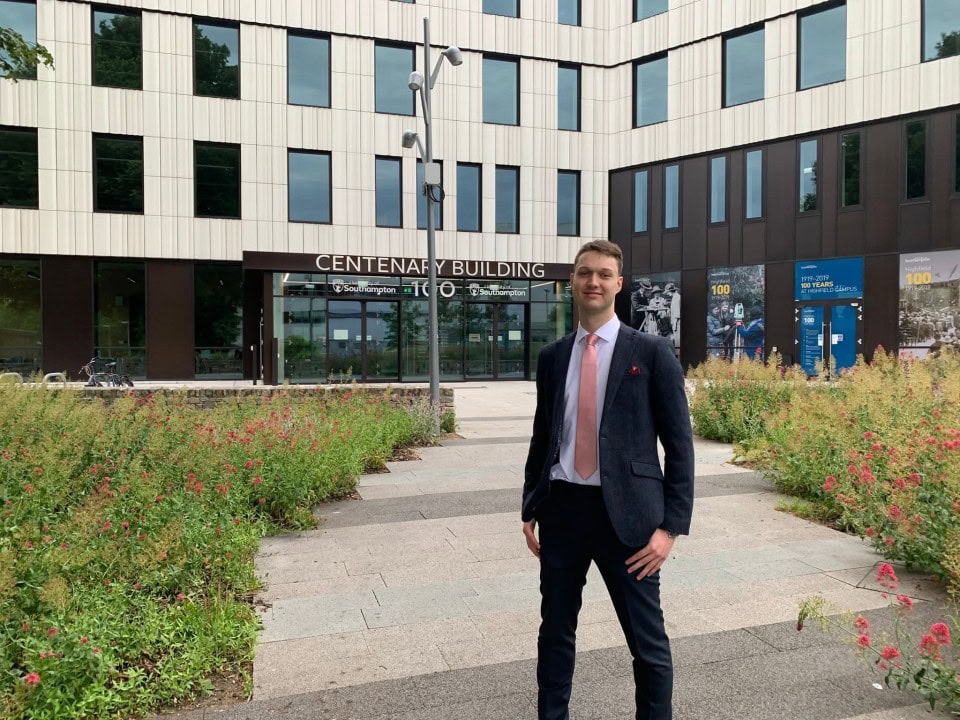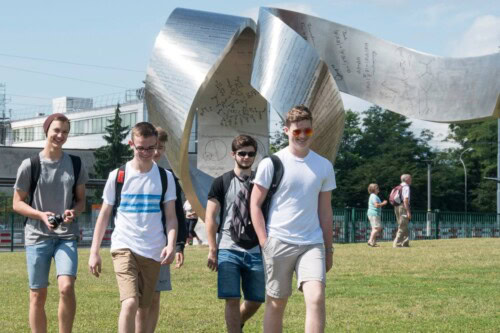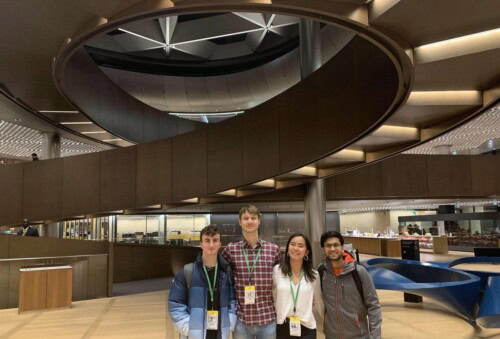Jacob Scott
Software Engineer

Alumni Jacob Scott is currently working as a Software Engineer. Having recently graduated with first class honours in MEng Computer Science from the University of Southampton he talks here about his education journey into Software Engineering.
School: Esher Church of England School
At Esher: 2016-2018
Subjects: Maths, Physics, Further Maths
When did you go to Esher college and what is your fondest memory of your time there?
I went to Esher Sixth Form College from 2016 to 2018 after graduating from Esher High. College was such a big change for me at the time and I have so many fond memories. Going from a small group of friends at school who were interested in maths and physics to meeting whole classes of people choosing to explore the subjects was such a cool experience. One of my fondest memories of college was our physics trip to Geneva, where we explored first-hand the tech behind the world’s largest super collider. The experience really was amazing. I think both the opportunity to see the science up close and the amazing dedication from the maths and physics departments really pushed me to pursue a career in STEM.
Which route did you take into Higher Education and what made you choose Computer Science?

Before I reached my final year at college, I hadn’t really considered computer science as a degree option. Initially, my search for universities began with looking at courses in physics. It wasn’t until some of the career fair days that I started to consider computer science – I had a GCSE in computer science but had never thought about it much further than that. I remember talking to my tutor Jon about it, and he gave me some material to look at and even some coding challenges from “Project Euler” to give me a head start and help me pick up some of the basics. From there I really picked it back up and fell in love with the challenges that the subject presented.
After looking at both courses and universities up and down the country, Southampton was the clear favourite of mine. The course had a wide range of optional modules as well. The artificial intelligence aspects really piqued my interest, and that partly inspired me to pursue a master’s course that would add an extra year of modules for me to explore. Computer science is such a vast subject, I feel that it can appeal to a real wide range of people if you know what you’re interested in.
What were your favourite projects to work on at University?
I’m so glad that I’ve been able to work on such a vast array of projects during my time at Uni. During my first year I started a project (just for fun) trying to build an LED laser turret after I saw a guy on YouTube make a similar thing. I integrated a pretrained AI model to detect my hand on my computer’s camera, did some maths using the size of the hands image, the focal length of the camera etc and translated that into rotation for the turret’s motors. In the end I had a laser that would automatically follow my hand in real time, which I thought was really cool. One of the best parts about computer science for me is being able to take an idea, implement it, and then use it in a practical scenario to actually make something happen. It’s a very rewarding process.
I’ve also had loads of opportunities to work on projects in what we call “hackathons” – essentially a 24-hour straight event where loads of students get together, brainstorm projects, and actually come up with implementations of them. The free food and drinks are usually what tempts most students, but I just loved the madness of diving into the deep end and making something really cool. Not all of these events are just for fun though; after a shorter version of one of these events, me and a group of friends were invited to the finals of a puzzle solving competition at Bloomberg HQ in London which was an amazing experience.
How hard is it get an Internship in Software Engineering?

In most software engineering roles, the interview process takes three main steps: a coding challenge, an initial interview, and a technical interview. For the coding challenge and technical interview, good practice on sites like HackerRank, and general algorithmics revision can go a long way. It isn’t all technical skills based; for the initial interview, most of it is for the company to learn more about you – how do you work well in a team? What do you like to do outside of the office, and how do you balance those hobbies with work? Questions like this gauge what kind of character you are, and where in a team you’ll most likely be successful. Some companies even use a personality type quiz to test things like your risk-taking ability, how you perceive challenges, and even how you communicate.
Engineers and mathematicians looking into joining the field are currently in a very lucky position, as there are lots of companies actively seeking out graduates (not just computer scientists) to join their teams. To sum up, the two main things I’d recommend is technical revision, and interview practice. Being able to confidently talk to an interviewer can go a long way.
What advice would you give your 17-year old self?
I think the change from GCSEs to A-Levels is a big one. In secondary school you can get by with just memorisation and good revision. With A-Levels, especially maths and science-based subjects, the most important thing is being able to understand it and apply it. Exam and coursework grades matter of course, but I think trying to learn the content, and make sense of it in my head rather than learning the exams themselves really helped in the long run. It’s useful to know how exams are going to ask you the questions, and exams offer a lot of good practice, but knowing how to solve the problems and more importantly why the underlying math makes it possible is a very useful skill, throughout A-Levels and beyond.
Another thing I would say, is stick with what you like. During my time in secondary I knew I really enjoyed maths, but I didn’t really know where to apply it. I didn’t know I’d be doing computer science until my second year of college either, but by studying what I liked and what I was good at, I’m quite happy to say that I’ve found a career that I really enjoy doing.